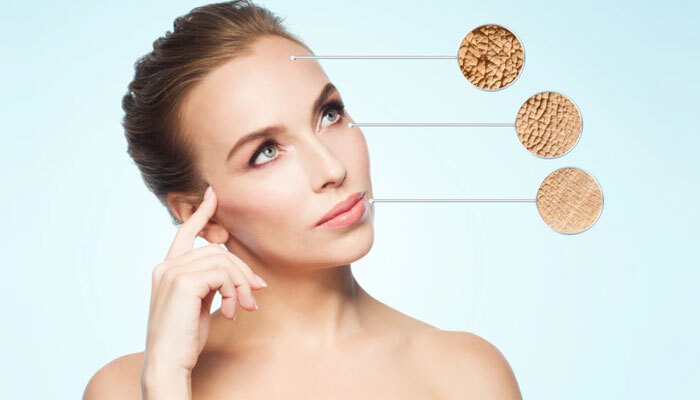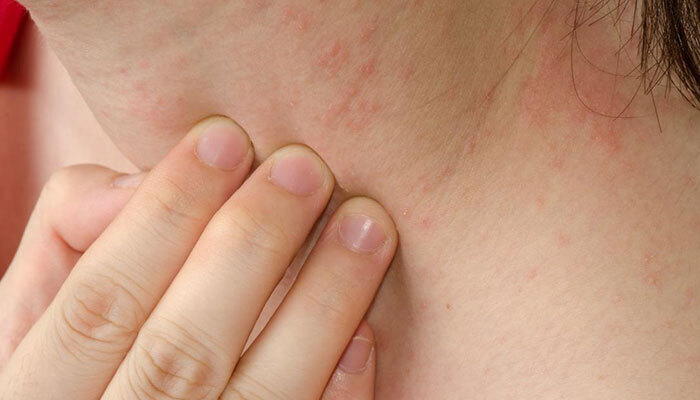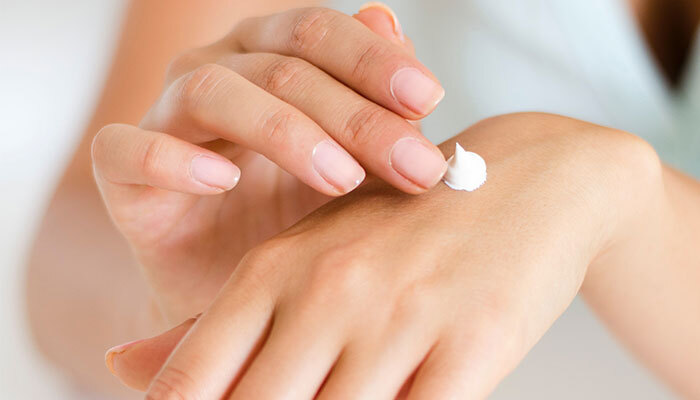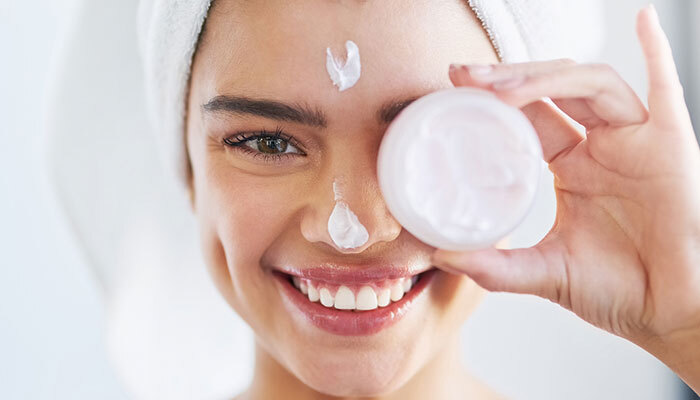Dry Skin problems generally aren’t serious. Skin Usually turns dry when it doesn’t have enough moisture to keep it soft and supple. Moisture in the air and climatic conditions are the main reasons in most cases. The probability of getting dry skin is higher in winters when our skin is exposed to colder temperatures and low levels of moisture in air.
People witness Rough patches that flake off and look scaly. Some dry skins aren’t itchy though severe ones can crack and bleed. In this article, we are going to share medical conditions and other reasons to cause dry skin problems and how to deal with them.
Cause of Dry Skin

Our skin naturally produces an oil called sebum. When our body fails to create or replenish enough sebum our skin turns dry, on the other hand, if too much oil is produced by our skin it results in pimples.
However, having an appropriate amount of sebum on our body is essential to keep it hydrated and protect the cells from infection.
Dry skin may or may not be itchy, it may look bumpy, flaky, or have red patches. It lacks oil, water, and appears dull and rough.
Some potential causes of dry and dehydrated skin include:
- Cold Weather
- Dry Air
- Harsh Chemicals in Soap
- Unbalanced pH of Skin
- Skin Conditions, like Atopic Dermatitis, Contact dermatitis, Seborrheic Dermatitis, & Psoriasis
- Diabetes
- Hypothyroidism
- Excess Smoking
- Exposure to Direct Sunlight
Now let’s discuss some skin conditions that can cause dry skin:
Contact Dermatitis

It’s a kind of Dermatitis that occurs when we contact an allergen, like Poison Ivy, Animal dander, or laundry detergents. It usually clears up on its own, but by identifying what had triggered Dermatitis, we can avoid it in future.
Contact Dermatitis can occur on any part of the body that has come in contact with the allergen. Exposed areas such as face and hands are more prone to get affected.
Some of the symptoms are as follows:
- Dry, Red, or scaly patches on the skin.
- Hives or rashes.
- Bursting Sensation or itching on affected areas.
- Leaking Blisters.
Atopic Dermatitis
Atopic Dermatitis also known as Eczema is a Chronic Disease that mainly affects children. Though the real cause is still a mystery, genetic and environmental factors play a significant role to cause this Dermatitis.
Some of the symptoms are as follows:
- Dry and Irritating Skin.
- Scaly Skin.
- Rashes
- Red to brownish-gray patches.
Seborrheic Dermatitis
Seborrheic Dermatitis is a condition that can cause Scaly patches & red skin, mainly on our scalp. It can also occur on the oily parts of our body such as face, chest, and back.
Along with Scaly patches & red skin, it can also cause Stubborn Dandruff. It might not go in first attempt and may require repeated treatment.
Some of the Symptoms of Seborrheic Dermatitis are as follows:
- Dandruff on your scalp, hair, eyebrows, beard, or mustaches.
- Red Skin
- Itching
- Greasy skin covered with a flaky crust on Scalp, face, nose. Eyebrows, Ear, Eyelids, Chest, Armpits, etc.
Ichthyosis Vulgaris
Ichthyosis Vulgaris is a skin condition that occurs when skin doesn’t shed its dead skin cells, it can be both inherited or acquired.
It happens when dry, dead skin cells get accumulated on the surface of skin. It’s also known as “Fish Scale Disease” as the accumulated dead skin is similar in pattern to fish’s scale.
Some of the symptoms of Ichthyosis Vulgaris are as follows :
- Dry & Itchy Skin.
- White, Gray, or brown scales.
- Thickened Skin.
- Multiple lines on palms & Soles.
- Rough bumps on the skin.
- Unable to sweat enough.
Psoriasis
It is a condition that causes skin cells to multiply up to 10 times faster than normal. Making the skin to build up & form scales and red dry patches.
Psoriasis is a common chronic skin disorder with no cure till date. The typical life cycle of a skin cell takes a month to complete. But in people with psoriasis, this process takes just a few days. This overproduction leads to the buildup of skin cells and causes psoriasis.
Some Symptoms of psoriasis are as follows:
- Plaques on the scalp
- Discoloration & pitting of the fingernails and toenails
- Bleeding when scratched
- Itchy and painful skin
- Rashes or patches of red
How to Prevent Dry Skin

Below we have mentioned A few tips that you can use to avoid dry skin:
- Wash face daily with a gentle cleanser.
- Use of Sunscreen every day.
- Apply Moisturizer after washing face and bathing.
- Use warm water for bathing and washing face.
- Drink plenty of water.
- Reduce caffeine intake
- Avoid contact with direct sunlight.
- Use a humidifier.
How to Treat Dry Skin

Treating dry skin may vary depending upon the cause and type of skin and its severity. People use several different measures to cure dry skin. Below we have mentioned a few methods you can use:
Use of a gentle cleanser
To avoid irritation and dry out of skin opt for mild, fragrance-free cleanser or facial soaps instead of those containing fragrance, colors, and several other chemicals.
Avoid use of products that contains:
- Sodium lauryl sulfate (SLS)
- Products contain mineral oils like petroleum and paraffin
- Parabens
- Diethanolamine (DEA)
- Monoethanolamine(MEA)
- Triethanolamine(TEA)
Moisturize daily
Moisturizing skin daily can alleviate dry skin by retaining water in your skin. It helps to keep your skin dehydrated, moisturizing your body can be extra beneficial. As there are several moisturizers available so it might take some to find the right one for you.
In general, you must choose gentle, face-friendly moisturizers that contains:
- Hyaluronic Acid
- Ceramides
- Colloidal Oatmeal
On the other hand, some moisturizers contain drying agents and can harm your skin. People must avoid products that contain:
- Alcohols
- Artificial fragrance
- Dioxane
- Petrolatum or petroleum
Exfoliate to remove excess dry skin
Our skin naturally develops new cells and sheds old ones. When dead cells are stuck on the skin we notice dry patches and clogged pores. Use of exfoliating helps to remove dead skin cells, thus reducing dry patches and improving overall texture of skin.
Exfoliator can either be mechanical or chemical:
Mechanical Exfoliator
Mechanical Exfoliator is used physically to remove dead body cells. It includes:
- Cleansing Brushes
- Exfoliating Washcloths
- Facial Scrubs
Chemical Exfoliator
Chemical Exfoliators are a great alternative to Mechanical Exfoliators. They contain alpha-hydroxy acids (AHAs) & beta-hydroxy acids (BHAs).
AHAs are responsible for dissolving cells on the surface of skin, whereas, BHAs penetrate deeper layers of the skin to remove dead cells from the pores. Both AHAs and BHAs help to keep skin soft and supple by increasing cellular turnover.
Practice better bathing habits
It is considered to use warm instead of hot water while bathing or washing face. Also, spending too much time in water removes sebum from our skin. According to the American Academy of dermatology, spending 5-10 min or less in shower can help to dry skin. Applying moisturizers right after taking shower or washing face can help to lock in moisture.
Use a humidifier
Constant use of Air conditioning and central heating systems removes moisture from the air. Individuals with dry skin problems must limit their use of AC and heating systems and start using humidifiers to add some extra moisture in air.
Medication
A skincare specialist also known as a dermatologist may prescribe a topical ointment or cream for people with dry skin issues and doesn’t respond to conventional treatments.
As skin type varies from person to person so does treating them depends on type of skin. Hydrocortisone is the most commonly found steroid while treating dry skin through medication.
Conclusion
In addition to environmental factors, lifestyle of individuals also adds up in development of dry skin on our body. Though dry skin is not a serious issue and can be rehabilitated easily using home remedies. Some chronic and persistent dry skin problems may require advice and medications from experts.

